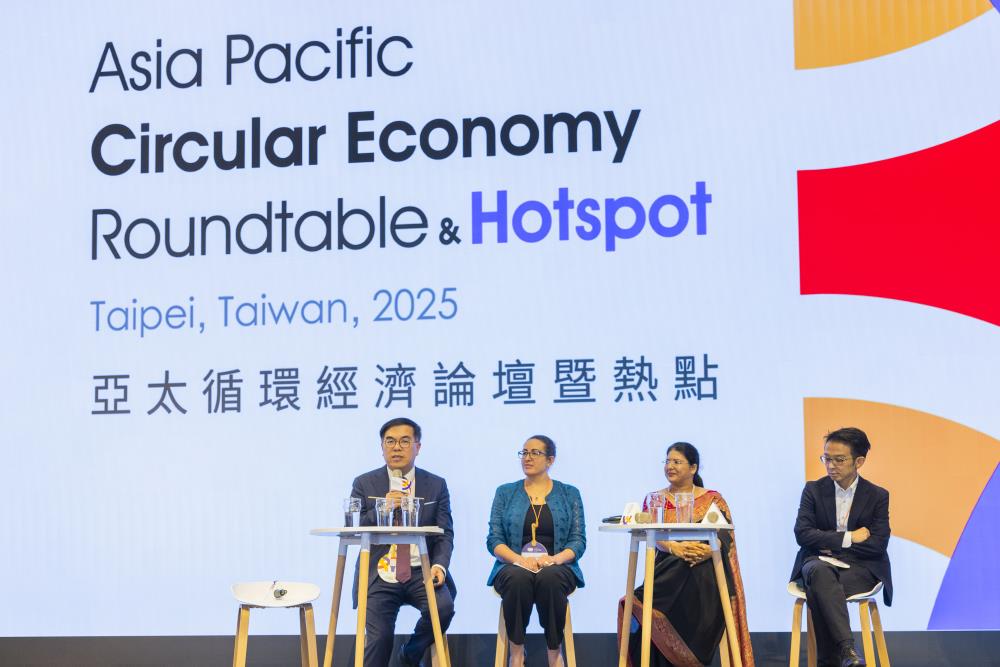
APCER 2025 in Taipei on Oct. 22 marks the first time the event has been held in Asia, attracting participants from more than 50 countries. (Photo: Ministry of Environment)
Taiwan’s Ministry of Environment (MOE) unveiled the draft Circular Economy Roadmap at the Asia Pacific Circular Economy Roundtable & Hotspot 2025 (APCER). This marks the first time the APCER has been held in Asia. Taiwan aims to use the event as an opportunity to learn from other countries, refine the draft, and build international partnerships.
Taiwan aims to increase its circularity rate by 2.5 times by 2050, compared with the level in 2020. The roadmap, scheduled for release next year, targets six key industries: textiles, biomass, plastics, architecture and construction, high-tech and electronics, and energy and critical materials. The APCER agenda has been designed to align with these focus areas.
The program began with site visits on the first day, highlighting circular initiatives in the private sector and local communities. Carlo Delantar, Head of ESG and Circular Economy at Gobi Partners in the Philippines, remarked after the tour, “Taiwan would be the best use case. If the circular economy works here, it should work everywhere.” Among participants from more than 50 countries, delegates from the Philippines made up a significant share.
Regional experts call for broader circularity approach
In one panel, experts from Japan, India, and Australia discussed circular economy roadmaps from an Asian perspective. They highlighted their countries’ respective strengths in advancing circularity, while also acknowledging weaknesses in related policies and measures.
Experts from Japan and India warned that many Asian industries still view circularity too narrowly, focusing mainly on recycling. Shinsuke Murakami, professor at the University of Tokyo’s Graduate School of Engineering, said the challenge lies in expanding the concept beyond waste management. Shalini Bhalla echoed this point, emphasizing that “circularity is more than recycling.” Both called for more systemic approaches that include small businesses and consumers.
In Japan’s effort to move beyond recycling, Murakami noted that traceability initiatives such as the Battery Passport were introduced last year. The QR-based system tracks batteries throughout their lifecycle to support reuse and recycling. In July, a Digital Product Passport (DPP) platform was also launched to record product data on a blockchain, enhancing transparency and traceability across supply chains.
Across the region, countries are taking steps to strengthen their circularity frameworks. In Australia, the Australian Sustainability Reporting Standards (AASB S1 and AASB S2), approved last year, require entities to disclose sustainability-related risks and opportunities that could reasonably affect their financial position. S1 is voluntary, while S2 is mandatory.
In India, the Waste-to-Wealth Mission promotes innovative technologies to turn waste into value. “Nothing is waste until we waste it,” Bhalla said.

Minister of Environment Chi-ming Peng joins experts from Japan, India, and Australia to discuss circular economy roadmaps from an Asian perspective. (Photo: Ministry of Environment)
Japan, meanwhile, released its 5th Fundamental Plan for the Establishment of a Sound Material-Cycle Society last year, positioning the circular economy transition as a core national strategy. The term Sound Material-Cycle describes a concept similar to the circular economy but places greater emphasis on society as a whole rather than on economic aspects, explained Murakami. New policies aligned with the plan are currently under discussion, including specific regulations for photovoltaic (PV) waste recycling.
Taiwan looks to Japan as model for PV recycling and circular roadmap
Taiwan’s 2035 Nationally Determined Contribution (NDC) sets an ambitious carbon reduction target of up to 40% compared with 2005 levels, the second-highest in Asia after Japan’s 56%.
Minister of Environment Peng Chi-ming (彭啓明) said Japan can serve as a model for Taiwan in developing its circular economy roadmap. Peng also expressed interest in Japan’s upcoming PV waste recycling regulation, noting that Taiwan is currently facing a solar panel recycling challenge. The MOE projects that by 2032, waste from decommissioned solar panels could reach around 50,000 metric tons.
Bhalla emphasized the importance of a clear roadmap, noting that it helps collect data, identify priorities, plan next steps, and make cities more livable. Peng said the APCER could mark a new chapter for regional collaboration, and stressed that the event is “not just talks,” but a starting point for real action.
.jpg)
